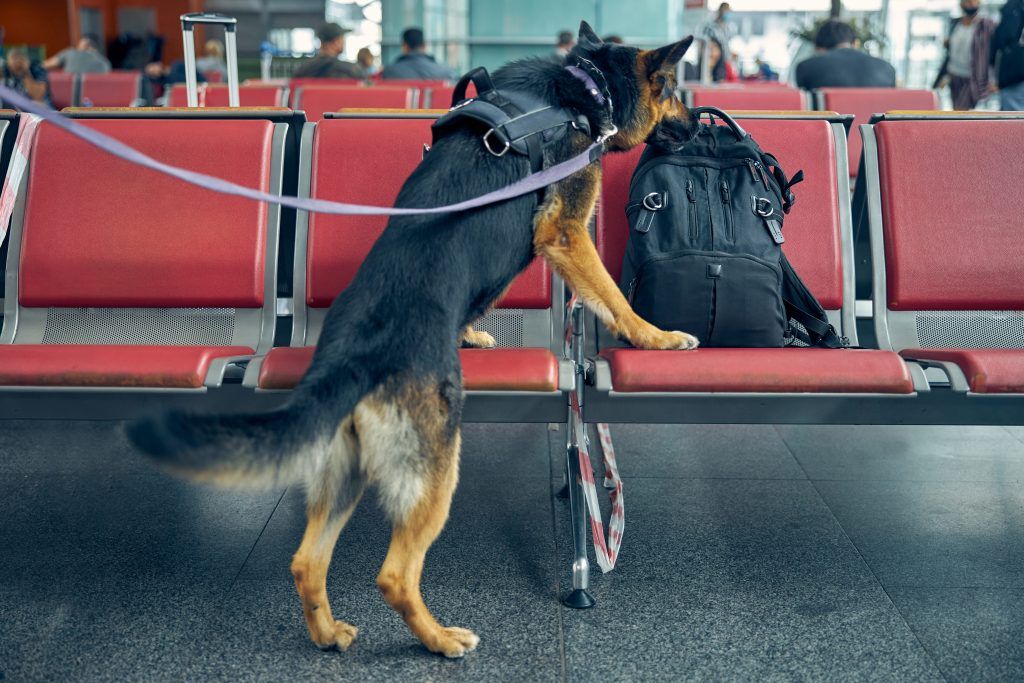Mushrooms are a type of fungi that can be edible, medicinal, or psychedelic. Some people use mushrooms for recreational purposes, such as to experience hallucinations or altered states of consciousness. However, mushrooms are also illegal in many countries and can have harmful effects on the body and mind. Law enforcement agencies often use drug dogs to detect and prevent the possession and trafficking of various drugs.
But can drug dogs smell mushrooms? And if they can, will they alert their handlers to them?
Yes, Drug Dogs Can Smell Them, But Will They Care?
The simple answer is yes, drug dogs can smell mushrooms. But whether they will alert their handlers to them is another matter. It depends on how the dogs are trained and whether or not they are taught to alert to shrooms.
Dogs have impressive noses, up to 300 million olfactory receptors compared to the 50 million we humans have. So they can sniff out, presumably, anything we want them to.
Drug detection dogs are trained to detect specific odors that are associated with certain drugs. For example, a dog may be trained to smell cocaine, heroin, or marijuana. The dog learns to associate these odors with a reward, such as food or praise. When they encounter the learned odor in the field, they signal their handler by barking, sitting, or scratching.
Most drug dogs are not trained to smell mushrooms. Mushrooms are not as common or as dangerous as other drugs, so they are a lower priority for law enforcement agencies.
It is unlikely and uncommon for police and airport authorities to train their drug dogs to detect mushrooms. That isn’t to say that it doesn’t happen, just that it depends on the specific department’s needs.
What Are Drug Dogs Trained to Smell?
Drug dogs are trained to smell different types of drugs depending on the needs and preferences of their handlers and agencies. Because drug-sniffing K9s are trained on up to 5 different scents, they will focus on the most common and dangerous drugs or the ones sold in the highest quantities in their area.
Some of the most common drugs that drug dogs are trained to smell are:’ Some of the most common drugs that drug dogs are trained to smell are:
- Cocaine
- Heroin
- Marijuana
- Methamphetamine
- Ecstasy (MDMA)
These drugs have distinct chemical structures and odors that are detected by drug dogs. Some drugs may have similar smells or may be mixed with other substances that mask their odors. For example, cocaine and heroin that is cut with baking soda, sugar, or flour. Marijuana mixed with tobacco or spices. Ecstasy could also contain other drugs, such as caffeine or ketamine.
Therefore, drug dogs need to be trained to distinguish between different drugs and their adulterants. They also need to be updated on new trends and variations of drugs that may emerge in the market.
According to a study conducted with the Polish police, marijuana was the easiest drug for dogs to find, and heroin was the most difficult. They also found that German Shepherds were superior compared to other breeds used, including labradors.

Photo Credit: Shutterstock
Why Not Mushrooms?
Mushrooms are not as commonly detected by drug dogs as other drugs for several reasons:
- Mushrooms are not as widely used or abused as other drugs. According to the United Nations Office on Drugs and Crime, mushrooms are among the least prevalent drugs in the world, with an estimated 0.2% of the global population using them in 2019.
- Mushrooms are not as harmful or addictive as other drugs. According to the Global Drug Survey, mushrooms are among the safest drugs in terms of risk of harm to self and others. They also have a low potential for dependence and withdrawal symptoms.
- Mushrooms have a diverse range of smells that drug dogs may not easily identify. Mushrooms belong to a large group of fungi that have different shapes, sizes, colors, and smells. Some mushrooms may smell like almonds, garlic, aniseed, or fish. Others may have no smell at all.
- Mushrooms may not contain any specific substances that drug dogs are trained to smell. Mushrooms that are used for recreational purposes usually contain psilocybin or psilocin, which are compounds that induce psychedelic effects. However, these compounds are not unique to mushrooms; they can also be found in other plants, such as peyote cactus or morning glory seeds.
The biggest answer really comes down to resources. Why would a department spend the time and money to train a drug dog to sniff out an uncommon substance? When training to find common, dangerous drugs will be far more productive.
What In Mushrooms Would They Be Trained To Smell?
If drug dogs are trained to smell mushrooms, they would most likely be trained to smell psilocybin or psilocin, which are the main psychoactive components of mushrooms.
Psilocybin and psilocin have a similar chemical structure to serotonin, a neurotransmitter that regulates mood, cognition, and perception. When ingested, psilocybin is converted to psilocin in the body, which then binds to serotonin receptors in the brain and causes hallucinations and altered states of consciousness.
According to 3DK9, a dog training facility that trains drug detection dogs, “K9s can be imprinted on any smell, so it’s completely within capabilities to have them detect just psilocybin.”
When asked if they had heard about dogs being trained to detect shrooms, they said, “It is not a common practice to imprint k9s on (shrooms) to the best of my knowledge”
How Are Drug Dogs Trained?
Drug dogs are trained using a combination of positive reinforcement and classical conditioning. Positive reinforcement is a method of teaching that rewards desired behaviors and discourages undesired behaviors. Classical conditioning is a process of learning that associates a neutral stimulus with a meaningful stimulus.
To train a drug dog, the handler first introduces the dog to the odor of the drug that it will be detecting. Most commonly, it will be a toy that has the smell rubbed on it. After the toy has the smell, they play with it, the dog learns to associate that smell with this fun new toy. The toy can be as simple as a towel or a t-shirt.
Once the dog has learned this smell, the game changes to a form of hide and seek. The handler may use a verbal command, such as “find it” or “seek,” or a hand gesture, such as pointing or nodding. The dog in training then should go hunt down its toy. The handler then rewards the dog with food or praise whenever it performs the correct signal.
The handler then exposes the dog to different scenarios and environments where it may encounter the odor of the drug. The handler may hide the odor in various places, such as luggage, vehicles, buildings, or people. The handler then rewards the dog with food or praise whenever it locates and signals the odor.
The handler then tests the dog’s accuracy and reliability by using different types and amounts of odors, as well as different types and amounts of distractions. The handler may use odors that are similar to or different from the drug that the dog is trained to detect, such as other drugs, food, perfume, or animal scents. The handler may also use noises, movements, or objects that may distract the dog from its task, such as other dogs, people, cars, or toys. The handler then rewards the dog with food or praise whenever it ignores the distractions and focuses on the odor.
The dog’s performance is evaluated to determine if corrections are needed. The handler may use verbal praise, such as “good boy” or “good girl,” or verbal reprimands, such as “no” or “bad.” The handler may also use physical praise, such as petting or hugging, or physical reprimands, such as pulling or pushing. The handler then repeats the training process until the dog achieves a high level of proficiency and confidence.
Best Breeds Used As Drug Dogs
Drug dogs can be any breed or mix of breeds that have certain characteristics that make them suitable for detection work. Some of these characteristics are:
- Keen sense of smell
- High level of intelligence
- Strong work ethic
- Physical ability
Some of the most common breeds used as drug dogs are:
- German Shepherd
- Labrador Retriever
- Belgian Malinois
- Beagle
- Bloodhound
These are some of the best breeds used as drug dogs, but they are not the only ones. Any dog that has the right characteristics and training can become a drug dog.
Final Thoughts
Drug dogs are amazing animals that can help law enforcement agencies combat drug-related crimes. They can smell different types of drugs, such as cocaine, heroin, marijuana, methamphetamine, and ecstasy. Magic mushrooms are not as common or as harmful as other drugs, so drug dogs are not likely to be trained to smell them.
Therefore, the answer to the question, “Can drug dogs smell mushrooms?” Yes, but they probably won’t.

























